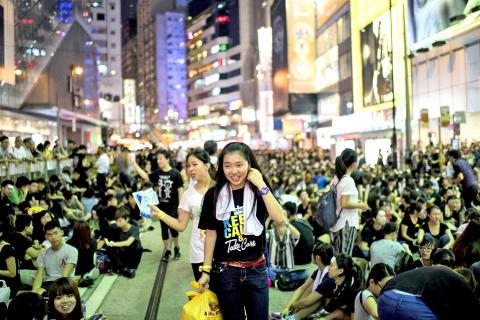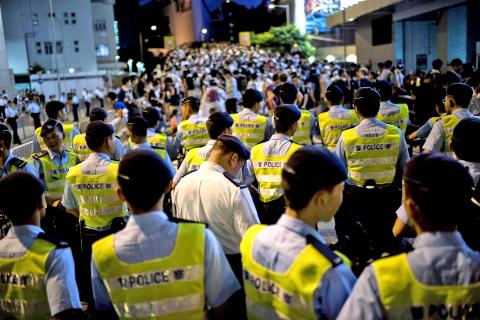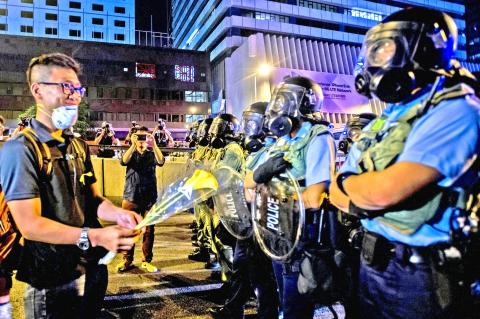Hong Kong democracy protesters defied volleys of tear gas and police baton charges to stand firm in the center of the global financial hub yesterday, one of the biggest political challenges for China since the Tiananmen Square Massacre 25 years ago.
The government in Beijing made clear it would not tolerate dissent and warned against any foreign interference as thousands of protesters massed for a fourth night in the free-wheeling, capitalist territory of more than 7 million people.
“Hong Kong is China’s Hong Kong,” Chinese Ministry of Foreign Affairs spokeswoman Hua Chunying (華春瑩) defiantly told a news briefing in Beijing.

Photo: AFP
The unrest, the worst in Hong Kong since China resumed its rule over the former British colony in 1997, sent white clouds of gas wafting among some of the world’s most valuable office towers and shopping malls, before riot police suddenly withdrew at about lunchtime.
Tens of thousands of mostly student protesters are demanding full democracy and have called on Hong Kong Chief Executive Leung Chun-ying (梁振英) to step down.
China rules Hong Kong under a “one country, two systems” formula that accords the territory only a degree of democracy.

Photo: AFP
As riot police withdrew, weary protesters slept beside roads or sheltered from the sun beneath umbrellas, which have become a symbol of what some are calling the “umbrella revolution.”
In addition to protection from the elements, umbrellas have been used as shields against pepper spray.
Nicola Cheung, an 18-year-old student from Baptist University, said the protesters in central Admiralty District were assessing the situation and planning what to do next.

Photo: AFP
“Yes, it’s going to get violent again because the Hong Kong government isn’t going to stand for us occupying this area,” Cheung said. “We are fighting for our core values of democracy and freedom, and that is not something violence can scare us away from.”
Organizers said that as many as 80,000 people have thronged the streets after the protests flared on Friday last week. No independent estimate of numbers was available.
The protests, with no single identifiable leader, bring together a mass movement of mostly tech-savvy students who have grown up with freedoms not enjoyed in mainland China. The movement represents one of the biggest threats for the Chinese Communist Party leadership since its bloody 1989 crackdown on pro-democracy student protests in and around Tiananmen Square in Beijing.
Cracking down too hard could shake confidence in market-driven Hong Kong, while not reacting firmly enough could embolden dissidents on the mainland.
The protests are expected to escalate tomorrow, China’s National Day holiday, with residents of the nearby former Portuguese enclave of Macau planning a rally.
Such dissent would never be tolerated on the mainland, where the phrase “Occupy Central” was blocked on Sunday on microblogs.
Protesters say there should be open nominations for candidates for Hong Kong’s 2017 leadership election. China’s rubber-stamp parliament endorsed a framework on Aug. 31 that ensured only pro-Beijing candidates.
Televised scenes of the chaos in Hong Kong over the weekend have already made a deep impression on many viewers outside Hong Kong.
Britain said it was concerned about the situation in Hong Kong and called for the right of protest to be protected.
The US Consulate General in Hong Kong issued a statement calling for all sides to “refrain from actions that would further escalate tensions.”
Hua said Beijing noted statements expressed by countries such as the US.
“We hope that the relevant country will be cautious on this issue and not send the wrong signal,” she said. “We are resolutely opposed to any foreign country using any method to interfere in China’s internal affairs. We are also resolutely opposed to any country attempting in any way to support such illegal activities like ‘Occupy Central.’”
“We are fully confident in the long-term prosperity and stability of Hong Kong, because I believe this is in keeping with the interests of all the people in China, the region and the world,” she said.
Earlier yesterday, police had baton-charged a crowd blocking a road into the main government district in defiance of official warnings.
Several scuffles broke out between police in helmets, gas masks and riot gear, and demonstrators.
“If today I don’t stand up, I will hate myself in future,” taxi driver Edward Yeung, 55, said as he swore at police. “Even if I get a criminal record, it will be a glorious one.”

AGING: As of last month, people aged 65 or older accounted for 20.06 percent of the total population and the number of couples who got married fell by 18,685 from 2024 Taiwan has surpassed South Korea as the country least willing to have children, with an annual crude birthrate of 4.62 per 1,000 people, Ministry of the Interior data showed yesterday. The nation was previously ranked the second-lowest country in terms of total fertility rate, or the average number of children a woman has in her lifetime. However, South Korea’s fertility rate began to recover from 2023, with total fertility rate rising from 0.72 and estimated to reach 0.82 to 0.85 by last year, and the crude birthrate projected at 6.7 per 1,000 people. Japan’s crude birthrate was projected to fall below six,

US President Donald Trump in an interview with the New York Times published on Thursday said that “it’s up to” Chinese President Xi Jinping (習近平) what China does on Taiwan, but that he would be “very unhappy” with a change in the “status quo.” “He [Xi] considers it to be a part of China, and that’s up to him what he’s going to be doing, but I’ve expressed to him that I would be very unhappy if he did that, and I don’t think he’ll do that. I hope he doesn’t do that,” Trump said. Trump made the comments in the context

SELF-DEFENSE: Tokyo has accelerated its spending goal and its defense minister said the nation needs to discuss whether it should develop nuclear-powered submarines China is ramping up objections to what it sees as Japan’s desire to acquire nuclear weapons, despite Tokyo’s longstanding renunciation of such arms, deepening another fissure in the two neighbors’ increasingly tense ties. In what appears to be a concerted effort, China’s foreign and defense ministries issued statements on Thursday condemning alleged remilitarism efforts by Tokyo. The remarks came as two of the country’s top think tanks jointly issued a 29-page report framing actions by “right-wing forces” in Japan as posing a “serious threat” to world peace. While that report did not define “right-wing forces,” the Chinese Ministry of Foreign Affairs was

PREPAREDNESS: Given the difficulty of importing ammunition during wartime, the Ministry of National Defense said it would prioritize ‘coproduction’ partnerships A newly formed unit of the Marine Corps tasked with land-based security operations has recently replaced its aging, domestically produced rifles with more advanced, US-made M4A1 rifles, a source said yesterday. The unnamed source familiar with the matter said the First Security Battalion of the Marine Corps’ Air Defense and Base Guard Group has replaced its older T65K2 rifles, which have been in service since the late 1980s, with the newly received M4A1s. The source did not say exactly when the upgrade took place or how many M4A1s were issued to the battalion. The confirmation came after Chinese-language media reported